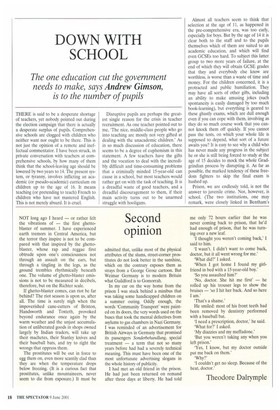Second opinion
NOT long ago I heard — or rather felt the vibrations of — the first ghettoblaster of summer. I have experienced earth tremors in Central America, but the terror they inspire is not to be compared with that inspired by the ghettoblaster, whose rap and reggae first obtrude upon one's consciousness not through an assault on the ears, but through a tingling in the legs, as the ground trembles rhythmically beneath one. The volume of ghetto-blaster emissions is not to be measured in decibels, therefore, but on the Richter scale.
If ghetto-blaster comes, can riot be far behind? The riot season is upon us, after all. The time is surely nigh when the impoverished cane-cutters of Brixton, Handsworth and Toxteth, provoked beyond endurance once again by the warm weather and the unjust accumulation of unliberated goods in shops owned largely by Indian traders, will take up their machetes, their Stanley knives and their baseball bats, and try to right the wrongs that oppress them.
The prostitutes will be out in force to egg them on, even more scantily clad than they are when the temperature drops below freezing. (It is a curious fact that prostitutes, unlike mountaineers, never seem to die from exposure.) It must be admitted that, unlike most of the physical attributes of the slums, street-corner prostitutes do not look better in the sunshine, which on the contrary exposes them as strays from a George Grosz cartoon. But Weimar Germany is to modern Britain what Guildford is to Gomorrah.
In my car on the way home from the prison I was stuck behind a minibus that was taking some handicapped children on a summer outing. Oddly enough, the words 'Community Transport' were painted on its doors, the very words used on the buses that took the mental defectives from asylums to gas chambers in Nazi Germany. I was reminded of an advertisement for British Airways in Germany that promised its passengers Sonderbehandlung, special treatment — a term that not so many years before had had a severely technical meaning. This must have been one of the most unfortunate advertising slogans in the whole history of publicity.
I had met an old friend in the prison. He had just been returned on remand after three days at liberty. He had told me only 72 hours earlier that he was never coming back to prison, that he'd had enough of prison, that he was turning over a new leaf.
'I thought you weren't coming back,' I said to him.
'I wasn't. I didn't want to come back, doctor, but it all went wrong for me.' 'What did?' I asked.
'When I got home I found my girlfriend in bed with a 15-year-old boy.' `So you assaulted him?'
'No, doctor. She hit me first' — he rolled up his trouser legs to show the bruises — `so I hit her back. And so here I am.'
'That's a shame.'
He smiled: most of his front teeth had been removed by dentistry performed with a baseball bat.
'I need a prescription, doctor,' he said. 'What for?' I asked.
'My diazzies and my meffadone.'
'But you weren't taking any when you left prison.'
'Yes, I know, but my doctor outside put me back on them.'
'Why?'
'I couldn't get no sleep. Because of the heat, doctor.'
Theodore Dalrymple


































































 Previous page
Previous page